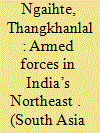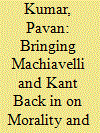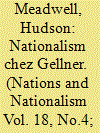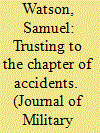| Srl | Item |
| 1 |
ID:
141777


|
|
|
|
|
| Summary/Abstract |
More than 60 years of de facto military rule through the Armed Forces (Special Powers) Act (AFSPA) 1958 in India’s northeast has engendered neither stability nor peace. Problems regarding the impunity of violence and crime, official corruption and the virtual collapse of the rule of law continue, but the Act remains in operation. This article attempts to reframe the debates on the AFSPA in terms of its necessity by turning the necessity argument on its head and arguing that the secessionist insurgencies which were originally used to justify the Act have actually long ceased to exist. Since the principle of existential necessity that provided a fig leaf to the Act no longer applies, its continued application needs to be re-examined. It is further argued that the Indian military’s increasing clout in internal security policy-making may have grave implications for Indian democracy itself, with negative impacts on the rule of law and in relation to safe inclusion strategies for India’s northeast.
|
|
|
|
|
|
|
|
|
|
|
|
|
|
|
|
| 2 |
ID:
167060


|
|
|
|
|
| Summary/Abstract |
This article is an attempt to understand the idea of morality in two of the most influential philosophers Niccolo Machiavelli (The Prince and Discourses) and Immanuel Kant (Perpetual Peace and Metaphysical Elements of Justice). Machiavelli and Kant are chosen because both of them are the most cherished philosophers in their fields. Machiavelli’s name is associated with realism, and he got a bad name because of his alleged cruel advice to maintain the state. His name is equalled with cunningness, murder, treachery. On the other hand, Kant is the founding figure of idealism in politics. His focus on categorical imperative and human capabilities to attain the higher moral goals made him one of the most well-known philosophers on idealism. To understand the ethical problems of the day emphasis is given to the classic writings of scholars who have written extensively on morality, justice, state, power, human rights and individual freedom. This article is an attempt to answer the following questions: Is the state in itself a highest moral actor? Can there be an individual morality above the state? What should be the yardstick to judge an act—the act in itself or the outcome of the act? What are the duties and rights of the individual in domestic society and can there be a similarity of morality at the level of political leaders in international politics? The paper argues that both Machiavelli and Kant were dealing with different contexts and societies, and morality for them had different meanings. However, the end justifies the means dictum is not the right way to understand Machiavelli on morality.
|
|
|
|
|
|
|
|
|
|
|
|
|
|
|
|
| 3 |
ID:
115224


|
|
|
|
|
| Publication |
2012.
|
| Summary/Abstract |
The central distinguishing feature of Ernest Gellner's most important treatment of nationalism is the proposition that nationalism is necessary for industrial society. Relatively little attention has been paid to the philosophical dimension of this proposition. The question of necessity in social explanation, however, is a complicated philosophical problem and must be dealt with directly if this proposition is to be endorsed. I argue that Gellner's argument is philosophically flawed. The 'ordinary prose' of Nations and Nationalism fails to deliver what Gellner claims to have delivered: the demonstration of a necessary connection between nationalism and industrial society. This result is of particular relevance given Gellner's philosophical interests.
|
|
|
|
|
|
|
|
|
|
|
|
|
|
|
|
| 4 |
ID:
117169


|
|
|